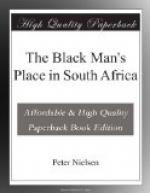“I have the gift of singing and dancing, my father had it, and his father before him. When I sing and dance people forget their sorrows, and when I leave a kraal, singing as I go, the people follow me for the joy of my song, so that sometimes I have to drive them away. Now it is easy to drive away old men and women, but who can drive away two pretty girls like these that have been made to speak against me to-day? When I sang and danced at their kraal their father gave me a goat because I had made his heart white and glad, and his daughters followed me and joined in the play—and I am young! When I become old and can no longer sing and dance the girls will not follow me. Why should I not be merry while I may? I never said a word to these girls, they followed me, I did not call them. But now, if the white men who listen to my words feel doubtful about what I say, then I would ask the judge to allow me to show them here and now how I can dance and sing, and if, after hearing and seeing me do so, they still think I am to blame, then I have no more to say; I shall go to gaol with a broken heart, and silent.”
The offer made by this African Apollo, I need not say, was not accepted, and he was found guilty and sentenced to a term of imprisonment with hard labour, but I remember that several of the jurymen expressed their astonishment afterwards at hearing so good a defence so pleasingly expressed by a raw Native youth who had never been to any kind of school.
On one occasion I had some trouble to make a Native complainant understand that the evidence upon which he relied was entirely hearsay and therefore of no avail against the man he wished to charge with a crime of theft. While talking an elderly Tebele arrived and I put the matter to him. He listened gravely and when I had finished he turned to the other and said:
“Have you not heard before that that which is heard only cannot be heard again in Court? You must bring witnesses who saw and heard themselves what you say has happened. The words of the man who says he heard the story from another is no testimony against a man when he is to be tried for a crime or a debt.”
After writing down this crisp and explicit statement from a Native whom I knew to have had little or no intercourse with educated Europeans I asked the old man if he had ever heard the matter discussed in a European Court. He said he had not, and seemed surprised that I should consider his words worth putting down in a note-book.
When it is realised how few laymen amongst ourselves are able to grasp the distinction between admissible and inadmissible evidence in a Court of Law, and how few would be able to express themselves as clearly as did this old, so-called, heathen, then the instance is seen to be worth citing.
I remember a Native witchdoctor who in defending himself against a charge of alleged witchcraft practice spoke thus:




